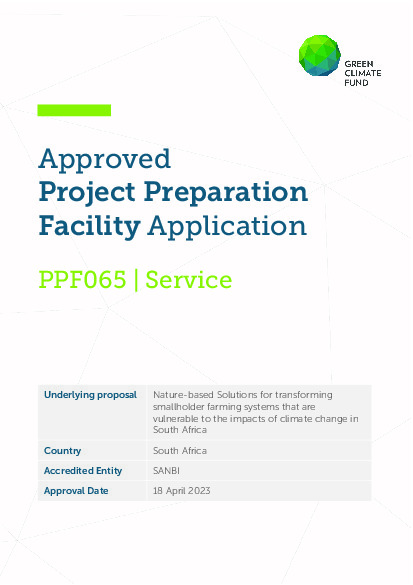Nature-based Solutions for transforming smallholder farming systems that are vulnerable to the impacts of climate change in South Africa

Nature-based Solutions for transforming smallholder farming systems that are vulnerable to the impacts of climate change in South Africa
South African smallholder farmers rely on rainfall and climate change is resulting in increased rainfall variability, which makes it difficult for farmers to plan and safeguard productivity. This is compounded by a lack of access to climate-risk informed agricultural advisory services to enhance their adaptive capacity. This, and recently the COVID-19 pandemic, is exacerbating existing vulnerabilities at the smallholder level, where agriculture is a vital source of livelihoods.
The proposed project will adopt a participatory, action-learning approach using nature- based solutions to enhance the resilience of smallholder farmers in vulnerable catchments in the provinces of KwaZulu-Natal, Eastern Cape, Mpumalanga and Limpopo in South Africa. This will be achieved through: i) providing tailored climate information and services through the development of a Multi-Hazard Early Warning System; ii) using nature-based solutions to transform smallholder farming systems to adapt to climate impacts and sustain adaptation investments; and iii) developing the cross-cutting capacity to institutionally embed and upscale transformative adaptation approaches. The project Concept Note was initially submitted to the GCF through the Simplified Approval Process window in December, and after two revisions to respond to comments from the GCF, was endorsed in October 2021, at which time SANBI was invited to submit a PPF request.
PPF support from the GCF is sought to fill in gaps in terms of information, stakeholder consultations and assessment of potential adaptation options, and to develop the full Funding Proposal through the Simplified Approval Process. The following PPF studies will be undertaken, some of which can be done remotely, and some of which will require on- the-ground consultations at the local level:
- Scoping phase
- Selection of Target Catchments
- Baseline Study and Vulnerability Assessment
- Pre-feasibility Study
- Environmental and Social Action Plan
- Gender Analysis and Gender Action Plan
- Stakeholder Engagement
- Risk Assessment and Management Plan
- Project Logframe, Monitoring and Evaluation Framework and Identification of Project-level Indicators
- Full Simplified Approval Process Funding Proposal write-up